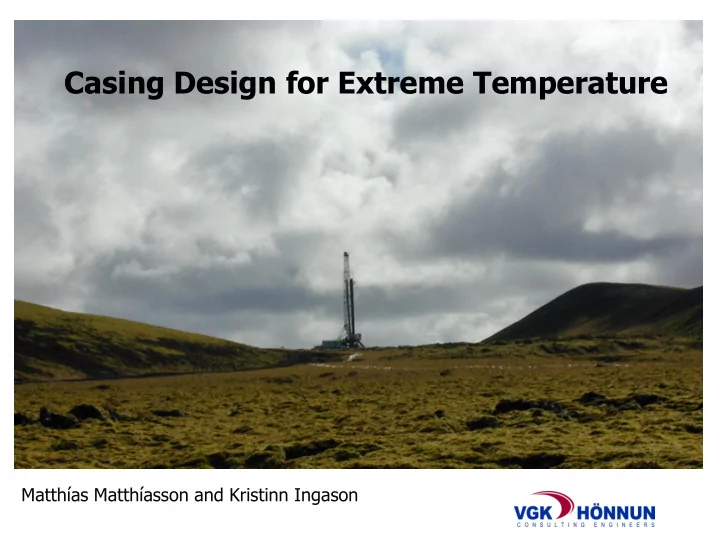

Casing Design for Extreme Temperature Matthías Matthíasson and Kristinn Ingason
Basic assumptions The hole will be cased off down to the critical point Bottom Hole Temperature max 550 C Bottom Hole Pressure max 26,7 MPa ASME and ASA codes or standards has to be “intertwine” into API standards The well shall be “ safe ” in flowing and closed conditions July 3, 2007: Engine
Critical Point (CP) CP represents the highest temperature and pressure at which the substance can exist as a vapour and liquid in equilibrium. CP for water: T C = 374 °C CP P C = 22,1 MPa July 3, 2007: Engine
Temperature and pressure assumptions above CP Boiling point curve to CP (3400 – 3500 m) Hydrostatic conditions to CP below CP Temperature will increase by 100 °C/km or Constant density with depth (Icochor) July 3, 2007: Engine
Reservoir temperature and pressure Static and Flowing Temperature [°C / °F] Temperature [°C] 0 100 200 300 400 500 600 0 100 200 300 400 500 600 0 0 0 100 200 300 400 500 600 700 800 900 10001100 Boiling water 20°C water 2000 Boiling water 1000 1000 4000 Temperature 2000 6000 2000 Depth [m / feet] 8000 Depth [m] 3000 3000 Pressure Temperature 10000 Pressure 4000 12000 4000 14000 5000 5000 16000 Flowing well 550°C, 25 MPa, 9" pipe Flowing well, isochor, 9" pipe Boiling water 1000 2000 3000 4000 5000 6000 7000 8000 20°C wate 6000 18000 6000 0 10 20 30 40 50 60 0 10 20 30 40 50 60 Pressure [MPa / psi] Pressure [MPa] July 3, 2007: Engine
Design conditions Basic parameters at wellhead Flowing well: T= 500°C and P= 19,5 MPa (Linear) T= 340°C and P= 14,5 MPa (Isochor) Closed well: T= 400°C and P= 22 MPa T= 20°C and P= 26.7 MPa July 3, 2007: Engine
Well Design July 3, 2007: Engine
Conclusions Diameter: ø13 5/8”, 88,2 lbs/ft for top 300 m of anchor casing ø13 3/8”, 72,0 lbs/ft for 300 to 2400 m of anchor casing Ø9 5/8”, 53,5 lbs/ft production casing Casing materials: T-95 type 1 and K-55 for anchor casing K-55 for production casing Casing connections: Hydril 563 (coupling and thread) Wellhead flange: ø10” ANSI, Class 2500 (material group 1.9, ANSI B16.5) Wellhead master vale: ø10” ANSI, Class 2500 (material group 1.9, ANSI B16.34) July 3, 2007: Engine
Stress Calculations axially σ z ; tangentially σ t ; radially r P A P D P m p m i m , , 2 , z t r A 2 t r Internal overpressure P m (MPa) Internal pipe area A p , (mm 2 ) Cross-sectional area of pipe wall A r (mm 2 ) Internal pipe diameter D i (mm) Pipe wall thickness t (mm). July 3, 2007: Engine
Stress Intensity Permissible stress levels: S 1 = z - t ; S 2 = r ; S 3 = z t r stress intensity S S = max( S 1 , S 2 , S 3 ) July 3, 2007: Engine
Allowable Stress defined by the equation: 2 2 1 1 , 1 S min S , S R , S , S R m Y Y Y T T T 3 3 3 3 SY = minimum yield strength at room temperature ST = minimum tensile strength at room temperature RY and RT are the ratios of minimum yield strength and minimum tensile strength at working temperature to room temperature respectively. Material Max. permitted stress intensity at prevailing temp Stress Intensity < Allowable Stress S < S m July 3, 2007: Engine
Casing material at elevated temperature (Thomas 1967, Snyder 1979 ) July 3, 2007: Engine
Elastic limit vs. temperature (Maruyama 1990) July 3, 2007: Engine
Tensile stress/strain curves (Maruyama 1990) July 3, 2007: Engine
ANSI B16.34 Wellhead master valve selection criteria PIPE FLANGES, ANSI B16.5 Material Group No. 1.2 (A216-WCC) 1.9 (A217-WC6) 450 400 Class 2500 350 300 20°C/267bar Working Pressure bar Material Group No. 1.2 Material Group No. 1.9 400°C/220bar 250 500°C/195bar Class 1500 200 340°C/145bar Material Group No. 1.9 150 100 Boiling Water Material Group No. 1.2 50 0 0 100 200 300 400 500 600 700 Temperature °C July 3, 2007: Engine
HYDRIL connections, type 563 July 3, 2007: Engine
Final Points Information on casing material at temperature higher than 350 C are scarce K55 appears to be the best suitable material Creep resistant material is needed for top part of anchor casing API T95 Premium connection are essential HYDRIL 563 Stress relaxation for K55 and L80 can be expected for temperature as low as 250 C Thermal cycling should be kept to minimum July 3, 2007: Engine
VGK-Hönnun hf. Grensásvegur 1, 108 Reykjavik, Tel: (+354) 422 3000 Web: www.vgkhonnun.is / E-mail: vgkhonnun@vgkhonnun.is July 3, 2007: Engine
Recommend
More recommend